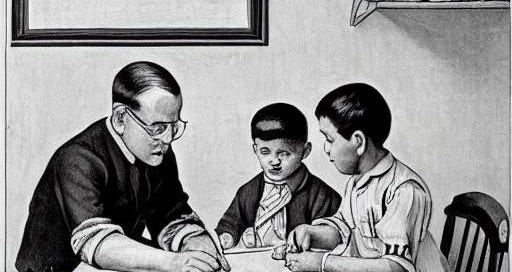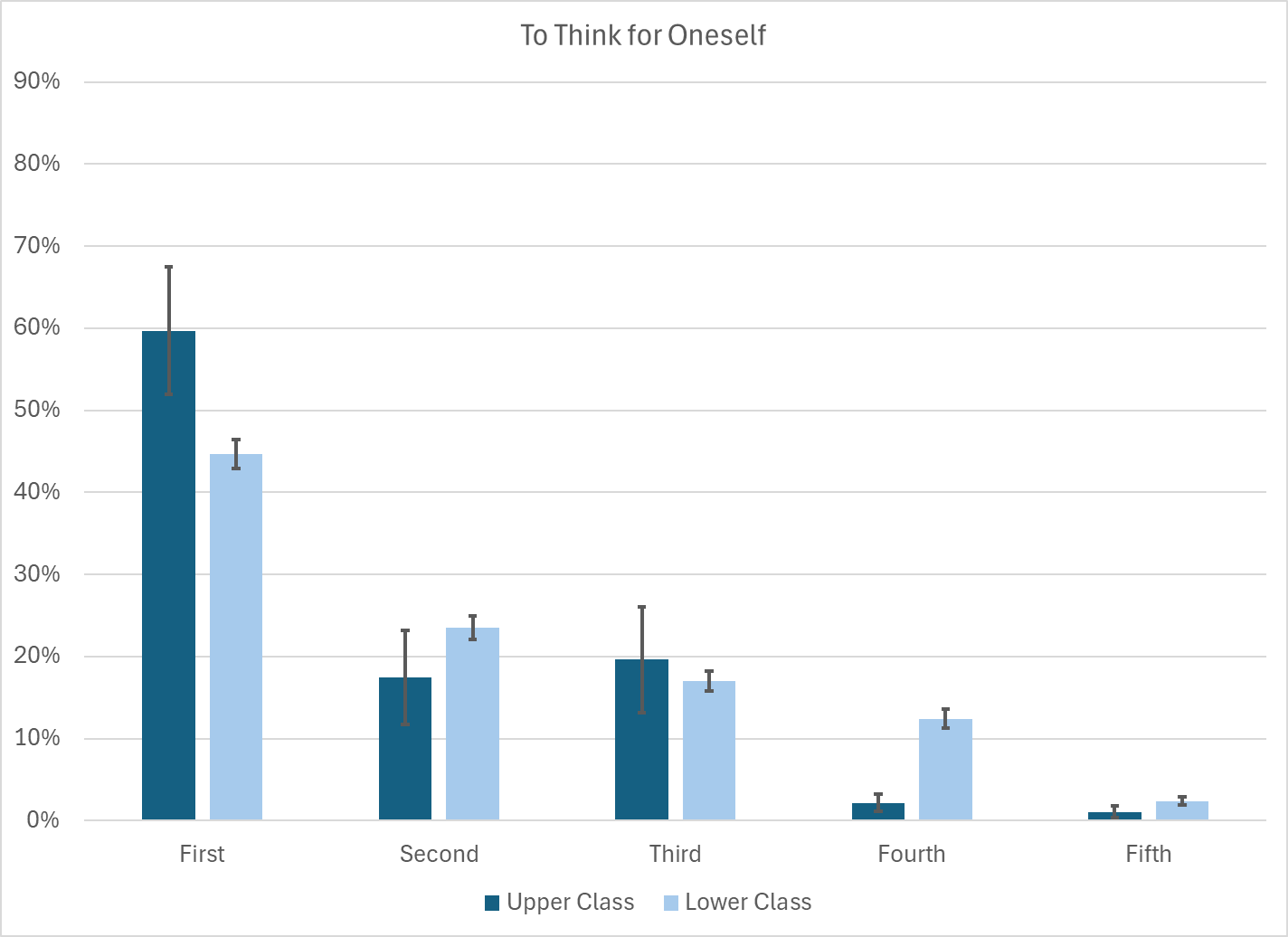The last three posts—yes, even including the critique of Henderson—have been building toward something.
This is the beginning of that something.
I am skeptical of the concept of luxury beliefs, in no small part, because I think that the views and values of the upper class are (a) not that different from everyone else, and, when they are, they’re (b) probably more reasonable, on average, than the rest of us.1
I want to spend several posts digging into class differences in values, beliefs, and public policy views. Where available, I also want to look at public policy knowledge—that is, factual information about government or politics.2
Because I think the upper class is, well, pretty okay. And when the upper class seems to believe something that (I think) is crazy, everyone else is usually right there with (or past!) them.
Today, I’m going to start with something not inherently in the public sphere, though: parenting. As it happens, the General Social Survey has a nice little battery of questions about what parents would teach their children. Here’s the question:
If you had to choose, which thing on this list would you pick as the most important for a child to learn to prepare him or her for life? Which comes next in importance? Which comes third? Which comes fourth?
To obey
To be well-liked or popular
To think for himself or herself
To work hard
To help others when they need help
We’ll look at these data, divided out by class. For upper class, I’ll employ both the economic definition we previously mentioned (the top ten percent of the respondents’ household income distribution) and also the educational definition I used previously in my critique of luxury beliefs. Let’s get started.
What the Economic Elite Value in Parenting
Here’s the answers of the economic elite, compared to everyone else, for the GSS in 2022 (take your time; I’ll see you when you’re done):
The bars are 95 percent confidence intervals. Now before anyone goes and gets excited about any one of these individual comparisons, please remember that the least bad test statistic for the difference between the economic upper class and everyone else on one of these questions is a chi-squared test of the equality of distributions. Yes, we could talk about whether any one pair of bars has overlapping confidence intervals, but that’s the least still-reasonable comparison we could make, and I’m going to (mostly try to) avoid it.3
So, with that in mind, I performed a chi-squared test on each of these pairs of distributions, and only one was statistically significantly different at conventional levels (i.e., p<0.05): to work hard.
Yes, you read that correctly. That ol’ luxury belief that success is due to luck rather than hard work? Apparently, the economic elite can distinguish between estimating the degree to which success is in an individual’s control and what lessons best equip a child for life, because they’re slightly more likely to prioritize that value relative to the rest of the population.
Now, the most reasonable thing here is to stop talking, since this is the only difference where we should really think that there might be something going on. But I’m going to comment on two little differences (that, again, are probably not that different) and then one more little thing:
About 10 percent of lower class parents (recall: non-upper-class, not “the poor”) prioritize children’s obedience, while essentially no upper class parents do. I do not think that this is a case where either one is wrong. Indeed, the best explanation is that there are situations where it makes sense to prioritize obedience and situations where it doesn’t, and those divide (on average) along class lines.
Slightly more lower class parents placed helping others on the top of the list, compared to the economic elite (there’s nearly no difference when considering the top two slots, though). But were this difference more precisely estimated and still hold, I don’t see how anyone could say the lower class were wrong. I’d just say they’re better people, frankly.
Perhaps it’s the structure of the question, and that respondents have to rank order these five items only, but does anyone really, really believe that no one wants their kid to be popular more than they want these other things?
What the Educated Elite Value in Parenting
Now, let’s redo the exercise with the educated elite:
Unlike with the economic elite, there are actually two statistically significant differences between the educated elite and everyone else. The educated upper class is is significantly less interested in obedience than everyone else (p=0.006) and the value they move up slightly to make room for their low ranking of obedience is… popularity (p=0.006)! Note that if we’re just looking at what people rank first, the educated elite values hard work less than everyone else (reversing the ranking we see when class is income-based, and possibly luxury belief territory), and the educated elite are much more likely to prioritize children thinking for themselves.
Conclusion
Yes, there are small class differences here. I’m shocked—shocked!—that the people who can’t organize a faculty meeting want children to think for themselves. And yet… are these really all that different? Describing these broadly, I see parents, elite or otherwise, prioritizing their children thinking for themselves, working hard, and then maybe helping others. Part of me feels that this ordering is a little selfish, and at the same time, it reminds me of the start of every flight I’ve ever taken: you have to put on your own mask first before assisting others.
And while I think there are good economic explanations for why upper class (economic or education-based) don’t prioritize obedience as much as everyone else4, I personally side with the lower classes on that issue. I wouldn’t characterize the upper class’s lack of emphasize on obedience as a “luxury belief”, but rather as ecological rationality: a priority that makes sense given the choices they and their children (likely) face.
Ok, I said ‘us’ as if I am not a member of the upper class. And I don’t feel like a member of the upper class, but… my mother earned a graduate degree, I attended a top 50 liberal arts college (so not elite, but not not-elite), my family income is solidly in the upper class bracket, and my family net worth is what most people call rich.
So while I’m about to spend several posts saying “look, I think the upper class, by resources or education, tends to hold views that, if others held them and lived by them, would make the world better”, on this particular view—that is, whether they themselves are the upper class—I will show they hold bat**** crazy views. And in that, I am like them. We’ll talk about it later, promise.
I’m also going to start sneaking in one-off posts on other topics. But I spent several pages setting this idea up, and for those of you who have subscribed since I started on this path, I’d like to take you to the other end of the forest if you’re still down for the walk.
Ok, the least-least reasonable is just to ask “which bar is bigger” for any topic that we care about. And yeah, we’ll do that, but it will be unreasonable when we do so!
Indeed, the most-oft made statement out of my mouth to my boys after varieties of “I love you” is “Do. What I tell you to do. When I tell you to. Do! It!” Yes, I teach a writing class for my department, and yes, that is the appropriate punctuation.















On "a priority that makes sense given the choices they and their children (likely) face." you nailed it but likewise you are creating a self fulfilling prophecy for them that will forever keep them in a cycle of mediocrity. Basically you are teaching a slave mentality along the lines "better a mediocre but comfortable life rather than chance a great life at the downside risk of a bad life". Does that make sense rationally, sure great lives are a zero sum game but likewise I'd say if you are "rich" you realize your "poor" competition isn't even trying to compete hence your likelihood of winning is vastly better than it should be simply by virtue you are willing to try. If the game rigged in your favor, you are a fool not to capitalize on that and THAT is what the "rich" rightly teach their children, "go for it and ask forgiveness later as chances are you will succeed"